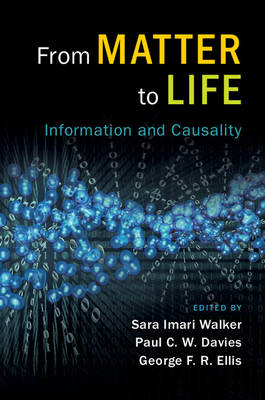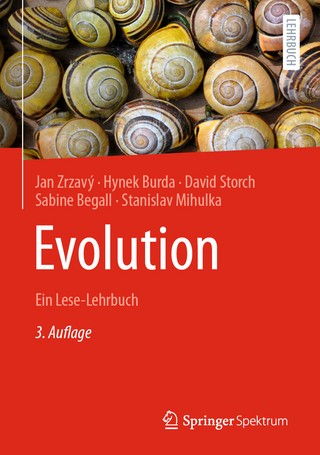
From Matter to Life
Cambridge University Press (Verlag)
978-1-107-15053-9 (ISBN)
Recent advances suggest that the concept of information might hold the key to unravelling the mystery of life's nature and origin. Fresh insights from a broad and authoritative range of articulate and respected experts focus on the transition from matter to life, and hence reconcile the deep conceptual schism between the way we describe physical and biological systems. A unique cross-disciplinary perspective, drawing on expertise from philosophy, biology, chemistry, physics, and cognitive and social sciences, provides a new way to look at the deepest questions of our existence. This book addresses the role of information in life, and how it can make a difference to what we know about the world. Students, researchers, and all those interested in what life is and how it began will gain insights into the nature of life and its origins that touch on nearly every domain of science.
Sara Imari Walker is a theoretical physicist and astrobiologist. She is an Assistant Professor in the Beyond Center for Fundamental Concepts in Science in the School of Earth and Space Exploration, Arizona State University. She is also a Fellow of the Arizona State University-Santa Fe Institute Center for Biosocial Complex Systems, co-founder of the astrobiology-themed social website SAGANet.org, and is a member of the Board of Directors of Blue Marble Space. She is active in public engagement in science, with recent appearances on 'Through the Wormhole' and NPR's Science Friday. Paul C. W. Davies is Regents' Professor and Director of the Beyond Center for Fundamental Concepts in Science at Arizona State University. He is a theoretical physicist, cosmologist and astrobiologist. He has written 30 books, many for the general public. In 1995 he was awarded the Templeton Prize for his work on the deeper meaning of science. He was also awarded the Faraday Prize by the Royal Society, the Kelvin Medal by the Institute of Physics, the Robinson Cosmology Prize, and three honorary degrees. In 2007 he was named a Member of the Order of Australia in the Queen's birthday honours list and in 2011 he received the Bicentenary Medal of Chile. The asteroid 1992 OG was renamed (6870) Pauldavies. George F. R. Ellis, FRS, is Professor Emeritus of Applied Mathematics at the University of Cape Town. He is a relativist and cosmologist who has worked on exact and perturbed cosmological models in general relativity theory and carefully studied observational limits in cosmology. He wrote The Large Scale Structure of Space Time with Steven Hawking. His more recent research relates to the philosophy of cosmology and the emergence of complexity. He has various honorary degrees, and was awarded the Star of South Africa Medal by President Nelson Mandela in 1999 and the Templeton Prize in 2004.
1. Introduction Sara Imari Walker, Paul C. W. Davies and F. R. Ellis; Part I. Physics and Life: 2. The 'hard problem' of life Sara Imari Walker and Paul C. W. Davies; 3. Beyond initial conditions and laws of motion: constructor theory of information and life Chiara Marletto; Part II. Bio from Bit: 4. (How) did information emerge? Anne-Marie Grisogono; 5. On the emerging codes for chemical evolution Jillian E. Smith-Carpenter, Sha Li, Jay T. Goodwin, Anil K. Mehta and David G. Lynn; 6. Digital and analogue information in organisms Denis Noble; 7. From entropy to information: biased typewriters and the origin of life Christoph Adami and Thomas Labar; Part III. Life's Hidden Information: 8. Cryptographic nature David Krakauer; 9. Noise and function Steven Weinstein and Theodore Pavlic; 10. The many faces of state space compression David Wolpert, Eric Libby, Joshua Grochow and Simon DeDeo; 11. Causality, information and biological computation: an algorithmic software approach to life, disease and the immune system Hector Zenil, Angelika Schmidt and Jesper Tegnér; Part IV. Complexity and Causality: 12. Life's information hierarchy Jessica Flack; 13. Living through downward causation: from molecules to ecosystems Keith D. Farnsworth, George F. R. Ellis and Luc Jaeger; 14. Automata and animats: from dynamics to cause-effect structures Larissa Albantakis and Giulio Tononi; 15. Biological information, causality and specificity – an intimate relationship Karola Stotz and Paul Griffiths; Part V. From Matter to Mind: 16. Major transitions in political order Simon DeDeo; 17. Bits from biology for computational intelligence Michael Wibral, Joseph Lizier and Viola Priesemann; 18. Machine learning and the questions it raises G. Andrew D. Briggs and Dawid Potgieter.
| Erscheinungsdatum | 01.03.2017 |
|---|---|
| Zusatzinfo | 49 Halftones, black and white |
| Verlagsort | Cambridge |
| Sprache | englisch |
| Maße | 158 x 235 mm |
| Gewicht | 880 g |
| Themenwelt | Naturwissenschaften ► Biologie ► Evolution |
| Naturwissenschaften ► Biologie ► Genetik / Molekularbiologie | |
| Naturwissenschaften ► Physik / Astronomie ► Astronomie / Astrophysik | |
| Naturwissenschaften ► Physik / Astronomie ► Quantenphysik | |
| ISBN-10 | 1-107-15053-1 / 1107150531 |
| ISBN-13 | 978-1-107-15053-9 / 9781107150539 |
| Zustand | Neuware |
| Informationen gemäß Produktsicherheitsverordnung (GPSR) | |
| Haben Sie eine Frage zum Produkt? |
aus dem Bereich


